Potrebujeme váš súhlas na využitie jednotlivých dát, aby sa vám okrem iného mohli ukazovať informácie týkajúce sa vašich záujmov. Súhlas udelíte kliknutím na tlačidlo „OK“.
ASTM D4844-03(2009)
Standard Guide for Air Monitoring at Waste Management Facilities for Worker Protection
Automaticky preložený názov:
Štandardné Guide pre monitorovanie pri nakladaní s odpadmi, o ochrane pracovníkov ovzdušia
NORMA vydaná dňa 1.2.2009
Informácie o norme:
Označenie normy: ASTM D4844-03(2009)
Poznámka: NEPLATNÁ
Dátum vydania normy: 1.2.2009
Kód tovaru: NS-28851
Počet strán: 8
Približná hmotnosť: 24 g (0.05 libier)
Krajina: Americká technická norma
Kategória: Technické normy ASTM
Kategórie - podobné normy:
Instalace a zařízení pro odstraňování a zpracování odpadů
Emise ze stacionárních zdrojů
Anotácia textu normy ASTM D4844-03(2009) :
Keywords:
disposal, hazardous, airborne, emissions, ICS Number Code 13.030.40 (Installations and equipment for waste disposal and treatment), 13.040.40 (Stationary source emissions)
Doplňujúce informácie
| Significance and Use | ||||||||||||||||||||||||||||||||||||||||||||||||||||||||||||||||||||||||||
|
The techniques of air monitoring are many and varied. This guide is intended to describe the standard approaches that are used in designing an air monitoring program to protect waste management site workers. When entering a remedial action site to initiate an investigation or a cleanup operation, operating personnel may be faced with the extreme hazards of fire, explosion, and acute or chronic health hazards. A thorough safety and health program, including a site-specific safety and health plan, must be in place to direct worker activity. Details for such plans can be found in the OSHA Interim Final Rule for Hazardous Waste Operations and Emergency Response and Refs (1, 2). Air monitoring is an integral part of such a program. This guide describes equipment and sampling procedures which can be used to evaluate the airborne hazard potential so as to gain and maintain control over the situation at the site. Upon obtaining readings at the site, a decision must be made as to whether conditions are under control or not. That decision will depend on the nature of the contaminants (toxicity, reactivity, volatility, etc.), the extent (area affected, number of workers, etc.) of the problem and the level of worker protection available. Since all such parameters will be site specific, the necessary decision-making is beyond the range of this guide. This guide does not include monitoring sites containing radioactive materials, nor does it cover general safety aspects, such as access to emergency equipment or medical support of emergency needs. These items should be covered in a safety and health plan. It is recommended that this guide be used in conjunction with Guide D 4687. |
||||||||||||||||||||||||||||||||||||||||||||||||||||||||||||||||||||||||||
| 1. Scope | ||||||||||||||||||||||||||||||||||||||||||||||||||||||||||||||||||||||||||
|
1.1 This guide is intended to provide a standardized approach for establishing and carrying out an air monitoring program to protect workers at waste management facilities. This guide may apply to routine operations at an active treatment, storage, or disposal site or the extraordinary conditions that can be encountered in opening and cleaning up a remedial action site. 1.2 Any user of this guide must understand that it is impossible to predict all the difficulties that could develop at a waste management facility due to hazardous airborne emissions. Although air contaminant measurements obtained in accordance with this guide may indicate acceptable or tolerable levels of toxic agents are present, care and judgment must still be exercised before concluding that all atmospheric contaminants at the site are under control. |
||||||||||||||||||||||||||||||||||||||||||||||||||||||||||||||||||||||||||
| 2. Referenced Documents | ||||||||||||||||||||||||||||||||||||||||||||||||||||||||||||||||||||||||||
|
Podobné normy:
Historická
1.9.2009
Historická
1.2.2007
Historická
1.5.2012
Historická
1.4.2013
Historická
1.11.2012
Historická
1.6.2014


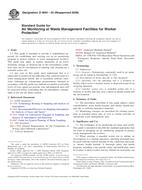
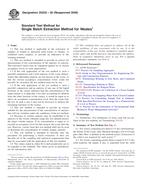 ASTM D5233-92(2009)..
ASTM D5233-92(2009)..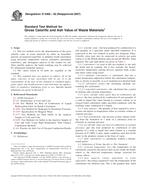 ASTM D5468-02(2007)..
ASTM D5468-02(2007)..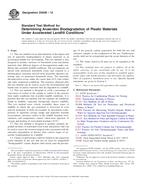 ASTM D5526-12
ASTM D5526-12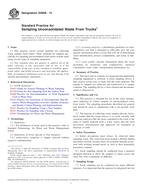 ASTM D5658-13
ASTM D5658-13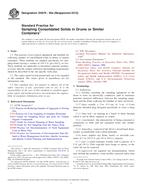 ASTM D5679-95a(2012)..
ASTM D5679-95a(2012)..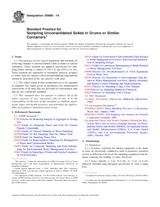 ASTM D5680-14
ASTM D5680-14
 Cookies
Cookies
